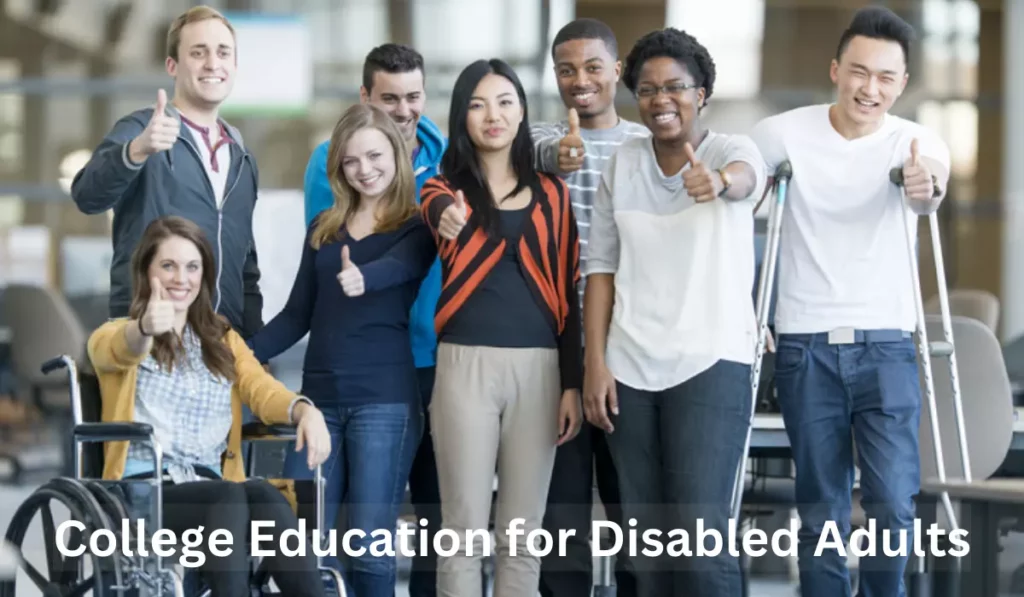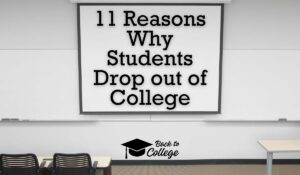You’re setting your sights on college, and your disability won’t hold you back. Understand your rights and find programs tailored to your success.
Explore majors that match your strengths and utilize tech tools like JABTalk to thrive academically.
Look into this guide to discover how disability resource centers support your journey and learn strategies to tackle any challenge that comes your way.
Your path to a degree is within reach—let’s navigate it together.
Explore comprehensive tips for disabled adults returning to college, ensuring an informed approach to accessing education in ‘College Education for Disabled Adults: Updated Resources for 2024’.
Can Adults With Disabilities Attend College?
Yes, adults with disabilities can attend college. Many institutions offer resources like disability services offices, assistive technologies, and tailored support to ensure accessibility and success. Federal laws mandate equal educational opportunities, enabling adults with disabilities to pursue higher education and achieve their academic and career goals.
You, as an adult with a disability, have the right to pursue higher education at colleges that are increasingly committed to accessibility and accommodation.
Legislation and policy mandate reasonable accommodations, ensuring you can access disability support and services.
Rest assured, your accessibility and rights are a priority, and students with disabilities are welcomed and supported throughout their academic journeys.
What Qualifies As A Disability?
A disability is typically defined as a physical or mental impairment that substantially limits one or more major life activities. This includes conditions affecting mobility, vision, hearing, learning, and mental health. The definition is broad, encompassing various impairments that hinder daily functioning or major life tasks.
Disabilities can range from physical impairments that affect mobility to learning disabilities that impact processing information, as well as intellectual and developmental conditions that influence cognitive functions.
Each of these categories has its own nuances and requires specific support to ensure you can thrive in an academic setting.
Physical Disability
A physical disability, which qualifies as an impairment under the Americans with Disabilities Act (ADA), includes conditions that substantially limit one or more of your major life activities.
The school’s disability services office is dedicated to accommodating students like you, ensuring you receive the necessary accommodations.
They may offer assistive technology and other support to navigate your academic journey with your physical disability.
Learning Disability
Learning disabilities that qualify for accommodations under the ADA range from dyslexia to attention deficit hyperactivity disorder (ADHD), impacting your ability to process information effectively.
Disability services recognize your documented disability and provide accommodations tailored to your specific disabilities and needs.
You’re not alone; support is available to ensure your learning experience is accessible and tailored to help you succeed.
Intellectual & Developmental Disability
Building on your understanding of learning disabilities, it’s important to recognize that intellectual and developmental disabilities, such as Down syndrome or autism spectrum disorder, also qualify for academic accommodations under the Americans with Disabilities Act (ADA).
Institutions like Landmark College offer comprehensive transition programs (CTP) with personalized support services, ensuring you receive the guidance necessary for a successful educational experience tailored to your intellectual disabilities.
Discover effective strategies on conquering the fear of returning to college as an adult, offering valuable insights in navigating this journey.
Rights Of Disabled College Students
As you step into the world of higher education, it’s crucial to know that you’re not alone and your rights are protected by robust legislation.
The Americans with Disabilities Act of 1990 (ADA) and Section 504 of the Rehabilitation Act of 1973 ensure that colleges provide you with necessary accommodations. These laws are your shield against discrimination, helping level the playing field so you can pursue your academic goals without undue barriers.
Individuals with Disabilities Education Act (IDEA)
Under the Individuals with Disabilities Education Act (IDEA), you’re entitled to specific educational rights that colleges must uphold to support your academic journey.
This Disabilities Act ensures you’re protected from disability discrimination, fostering an inclusive education and college experience.
Americans with Disabilities Act of 1990 (ADA)
Beyond the protections offered by IDEA, you’ll find the Americans with Disabilities Act of 1990 (ADA) provides additional rights that colleges must respect, ensuring every qualified student with a disability has equal access to educational opportunities.
As a civil rights law, the ADA empowers you, reinforcing your student rights and affirming that disabled students deserve an inclusive academic environment free from discrimination.
Section 504 of the Rehabilitation Act of 1973
Frequently, you’ll find your rights as a disabled college student further supported by Section 504 of the Rehabilitation Act of 1973, which prohibits discrimination based on disability in any program receiving federal financial assistance.
Whether facing developmental or psychological disabilities, you’re entitled to educational programs and accommodations that ensure equal opportunity.
Colleges With Programs For Disabled Adults
You’ll find that several colleges have stepped up to offer tailored programs for disabled adults, understanding that accessibility and support are key to inclusive education.
Institutions like Davis & Elkins College and King’s College have designed environments where you can thrive academically, regardless of your unique needs.
Programs at schools such as Marist College, Landmark College, and Marymount Manhattan College are shining examples of how higher education is adapting to empower you to reach your full potential.
Davis & Elkins College (Elkins, WV)
At Davis & Elkins College in Elkins, WV, you’ll find a supportive educational environment with specialized programs designed to cater to the needs of disabled adults.
Their commitment to higher education includes comprehensive accessibility services, ensuring accommodations under Section 504 of the Rehabilitation Act.
You’ll develop crucial independent living skills through personalized instruction, supervised study sessions, and dedicated writing assistance, enhancing your academic and social experience.
King’s College (Wilkes-Barre, PA)
Within the nurturing campus of King’s College in Wilkes-Barre, PA, you’ll discover programs tailored for disabled adults that emphasize both academic success and personal growth.
Their First-Year Academic Studies Program offers customized academic coaching and accessibility services to foster a supportive college experience.
As you navigate your college education, you’ll find reasonable accommodations and a community committed to empowering students with disabilities to thrive.
Marist College (Poughkeepsie, NY)
Similarly, Marist College in Poughkeepsie, NY, often sees disabled adults excelling through its Learning Disabilities Support Program. This program pairs you with a learning specialist to enhance your academic skills and self-management. The support provided by this program champions your journey to academic success in postsecondary education. It ensures that you receive the necessary accommodations under the Rehabilitation Act.
Marist College’s commitment to supporting disabled adults extends beyond academic assistance. The college also offers wellness services to promote your overall well-being. By fostering an inclusive environment, Marist College creates a space where you can thrive and reach your full potential.
Landmark College (Putney, VT)
Why settle for a one-size-fits-all education when Landmark College in Putney, VT, offers tailored programs that cater to your unique learning needs as a disabled adult?
Here, continuing education means personalized accommodations and developing key study skills.
Embrace an environment where self-advocacy is nurtured and your educational journey is respected.
Landmark College truly understands and supports your distinct pathway to success.
Marymount Manhattan College (New York, NY)
At Marymount Manhattan College in New York, NY, you’ll find a supportive educational environment with programs specifically designed to accommodate your needs as a disabled adult.
The college’s disability support services include note-takers, extended time for tests, and personalized academic coaching.
You can also explore financial aid options that ensure you have access to these essential services for a successful college experience.
West Virginia Wesleyan College (Buckhannon, WV)
You’ll also find dedicated support at West Virginia Wesleyan College, where one-on-one assistance is a key part of their programs for disabled adults.
As a college student here, you’re embraced by a campus life that values inclusivity. With access to professional tutors and organizational mentors, you can pursue associate degrees confidently.
They provide financial resources and services designed to protect students, ensuring every individual thrives.
Muskingum College (New Concord, OH)
Exploring Muskingum College in New Concord, Ohio, you’ll discover a supportive environment tailored to disabled adults through the PLUS Program, which provides comprehensive assistance across various aspects of college life.
This inclusive learning environment ensures your college’s success with personalized accommodations and support services. As a student with disabilities, you’ll benefit from dedicated resources aimed at fostering academic achievement and personal growth.
Best 5 Majors For Disabled College Students
As you navigate the college landscape, certain majors stand out for their adaptability to a range of needs and interests. Disabled high school students or young adults can acquire the necessary learning skills and achieve success by studying any of these:
1. Psychology
Psychology, a field ripe with opportunities for understanding human behavior, may be an ideal major for you as a disabled college student seeking a versatile and accommodating academic path.
Aligning this choice with your goals, career training in psychology often includes internship opportunities that can enhance your time management and self-advocacy skills, essential competencies that will empower you in both your professional and personal life.
2. Web Development
In addition to psychology, web development stands out as a major for you to consider, offering flexibility and high demand amidst the digital era’s surge in technology-based careers. As you attend college, you’ll find that mastering the latest technology enhances your skillset, making you invaluable.
Scholarship opportunities can help manage college expenses, ensuring student life is enriched, not burdened, by your pursuit of knowledge and innovation.
3. Social Media Management
Shifting your focus to social media management, you’ll discover a major that taps into the pulse of digital communication and offers a platform for creativity and strategic thinking.
Colleges provide you with access to extracurricular activities, campus groups, and other resources, ensuring you’re well-supported.
Dive into this vibrant field where your voice amplifies diverse perspectives, connecting you with students globally.
4. Business Management
Another major that you might find both accessible and rewarding is Business Management. In this major, you’ll learn to orchestrate operations and drive innovation in any sector you choose.
As a student, you can tailor your academic goals to suit your needs for independent living. Many schools offer resources and federal financial aid to ensure you’re supported throughout your educational journey.
This support empowers you to thrive in the business world.
5. Liberal Arts
Beyond Business Management, you’ll find that a major in the Liberal Arts offers extensive flexibility and fosters critical thinking, making it an excellent choice for disabled college students seeking a broad educational foundation.
When considering funding and financial aspects, explore schools where you can receive federal funding. Choosing the right school and securing resources in a timely manner will pave the way for a rewarding educational journey.
Online College Education For Disabled Students
As a disabled student, you’ll find that online college education offers flexible and accessible learning opportunities tailored to your needs.
Most colleges understand the unique challenges you face, ensuring that disabled adults like you receive an inclusive educational experience.
Whether you’re transitioning from high school or managing other aspects of life, online education provides the pathway to your academic and professional goals.
Financial Aid for Disabled Students
You’ll find plenty of financial aid options at your disposal to help manage the costs of your college education. As a young adult facing unique challenges, you’re not alone.
From scholarships designed for test-taking accommodations to grants offered by the National Center for College Students with Disabilities, there’s robust support to ensure your academic journey is both accessible and affordable.
Embrace these resources with confidence.
Educational Resources For Students With Disabilities
As you navigate your college journey, you’re not alone; scholarships and grants specifically designed for students with disabilities can significantly ease the financial strain.
In addition to monetary support, a wide array of educational apps offer tailored assistance to enhance your learning experience.
These resources are created to ensure you have equal access to education and the opportunity to thrive academically.
Scholarships And Grants
Navigating college funding, you’ll find that scholarship and grant opportunities specifically designed for students with disabilities can significantly ease the financial burden of higher education.
These resources are tailored to support your unique needs, providing a more accessible path to your academic goals.
Rest assured, there’s a community invested in your success, eager to help you secure the education you deserve.
Educational Apps
Beyond scholarships and grants, various educational apps offer you practical tools to tailor your learning experience to your specific needs. These apps can enhance your accessibility, whether through text-to-speech functions, communication boards, or note-taking support that caters to different learning styles.
They’re designed with your success in mind, ensuring you have equal opportunities to thrive academically.
Informing Your College About Your Disability
When you’re ready to embark on your college journey, it’s important to be open about your disability to ensure you receive the accommodations you need.
You’ll need to provide documentation of your disability to access tailored support services, which can range from assistive technologies to service animals.
Types Of Accommodation
As a disabled adult, you’ll need to inform your college about your disability to receive the appropriate accommodations for your educational success. These may include extended time for exams, note-taking assistance, sign language interpreters, or adaptive technology.
It’s essential to communicate your needs early on to ensure your college experience is both accessible and rewarding. Remember, it’s your right to access suitable support for your learning journey.
Documentation Of Your Disability
To ensure your needs are met, it’s crucial to provide your college with documentation of your disability. This documentation should clearly outline your condition and suggest reasonable adjustments. Your college’s disability services office will treat your information with confidentiality and use it to tailor support that aligns with your unique educational journey.
By providing this documentation, you are giving your college the necessary information to arrange the necessary accommodations for you. This ensures that you receive the support you need to succeed in your studies. It is important to outline your condition and suggest reasonable adjustments in your documentation, as this will help the disability services office understand your specific needs.
Rest assured that your college’s disability services office will treat your information with confidentiality. They have a responsibility to protect your privacy and will use the information you provide to tailor support that aligns with your unique educational journey. This means that the accommodations and services they offer will be specifically designed to address your needs and help you thrive in your college experience.
Service and Support Animals in College
Why not consider a service or support animal as part of your college accommodations, ensuring you’ve informed your college’s disability services office about your needs?
Bringing your animal companion can optimize your academic experience. They’re not just pets; they’re essential for your well-being.
3 Available Services For Disabled Students
As you navigate your college experience, you’ll find that a range of services are tailored to support your specific needs. From cutting-edge assistive technology to specialized housing accommodations and vocational rehabilitation services, these resources are designed to ensure you have equal access to education.
It’s vital to explore each option to fully understand how they can enhance your academic journey.
1. Assistive Technology
In your pursuit of higher education, you’ll find that colleges offer a range of assistive technology services tailored for students with disabilities. These tools are designed to facilitate your learning experience, ensuring you have equal access to educational opportunities.
From screen readers and voice recognition software to alternative input devices, you’re supported in achieving your academic goals with the right technological accommodations.
2. Housing Accommodation
You’ll find that many colleges provide specialized housing accommodations to ensure your living environment supports your needs as a student with disabilities. These services can include modifications like wheelchair-accessible rooms, visual alarm systems, and adjustable furniture.
They’re designed with inclusivity in mind, ensuring you have a comfortable, functional space to live and learn.
Don’t hesitate to reach out to your college’s disability services to explore your options.
3. Vocational Rehabilitation Services
Beyond housing accommodations, your college may offer vocational rehabilitation services to support your educational and career goals. These tailored services might include career counseling, job placement assistance, and adaptive technology training. They’re designed to navigate your unique challenges, ensuring you have the skills and resources to thrive in your chosen field.
Embrace these opportunities—they’re there to empower you towards a fulfilling and successful career.
List Of Resources To Help You Prepare For College
As you gear up for college, it’s important to know you’re not alone; there’s a wealth of resources tailored to meet your needs. Whether you’re looking for strategies to manage ADHD learning disabilities or need to understand your rights regarding service animals, guidance is at your fingertips.
Let’s explore some key tools, such as the Talking Scientific Calendar and the Verywell Family’s insights, to ensure you’re well-prepared for your academic journey.
Talking Scientific Calendar
To gear up for college, consider utilizing a talking scientific calendar, an invaluable tool designed to help disabled adults manage their time and stay on top of academic responsibilities.
This device speaks out dates and reminders, ensuring you’re always informed and prepared.
Embrace this supportive resource; it’s tailored to make your educational journey smoother and more accessible, empowering you to excel in your college endeavors.
Verywell Family “Success Strategies for College Students with Learning Disabilities
You’ll find that the Verywell Family offers a comprehensive guide dubbed ‘Success Strategies for College Students with Learning Disabilities,’ a resource packed with tips and strategies to help you navigate college preparation effectively.
It’s designed to empower you, ensuring you’re equipped with the knowledge to tackle academic challenges.
Dive in to discover a supportive community, tailored advice, and practical tools to enhance your learning journey.
Secrets to Studying Better with ADHD
Students with ADHD can enhance their college preparation by utilizing a variety of resources designed to improve study habits and academic performance. You’ll find tailored strategies and supportive tools that address your unique learning style.
Embrace these aids; they’re crafted to help you master your studies and thrive academically. Remember, you’re not alone, and with the right resources, college success is within your reach.
Effective Communication: Faculty and Students with Disabilities
Building on the tailored strategies for studying with ADHD, effective communication between faculty and disabled students is another critical component. There are numerous resources available to help you prepare for this aspect of college life. They’ll ensure you’re heard and understood, bridging gaps and fostering an inclusive academic environment.
Engage confidently, knowing there’s strong support to amplify your voice.
Service Animals – U.S. Department of Justice, Civil Rights Division
Transitioning from effective communication strategies, you’ll find service animals are another crucial aspect of college preparedness.
The U.S. Department of Justice, Civil Rights Division offers comprehensive guides and legal insights to ensure your rights are protected on campus.
Their resources will help you navigate college life with your service animal, providing clear explanations of your entitlements and the responsibilities of educational institutions.
Wheelmate App
In addition to understanding your rights with service animals, you’ll find that the Wheelmate app is an indispensable tool for locating accessible restrooms and parking spots on and around campus.
This app ensures that your college experience is as seamless as possible by helping you navigate your environment confidently and focus on your academic success.
You can use the Wheelmate app to easily find accessible restrooms and parking spots, eliminating the added stress of accessibility concerns.
7 Educational Apps for Students with Disabilities
As you navigate your college journey, there are innovative apps designed to support your unique learning needs.
Tools like BlindSquare and the iPhone’s built-in accessibility features empower you with greater independence on campus.
Meanwhile, apps such as Dyslexia Keyboard and Be My Eyes offer tailored assistance that can enhance your academic experience.
1. Blindsquare
You’ll find that Blindsquare is an innovative app designed to help visually impaired students navigate college campuses more effectively.
It empowers you by turning your smartphone into a reliable audio guide, detailing your surroundings, and providing directions to classrooms, cafeterias, and libraries.
Embrace this technology to enhance your independence and ensure your educational journey is as rich and accessible as anyone else’s.
2. iPhone Accessibility Features
Your iPhone’s built-in accessibility features can transform how you engage with educational apps, making your college experience more inclusive and manageable.
VoiceOver reads the screen aloud, while Zoom magnifies text for clarity.
Dictation simplifies note-taking, and AssistiveTouch allows customized gestures.
Explore these tools to fully participate in your learning journey, ensuring no barrier hinders your academic success.
3. Dyslexia Keyboard
Students with dyslexia can enhance their writing accuracy using the app’s tailored keyboard. The keyboard is designed to mitigate common challenges faced when typing. It’s supportive, considering your unique needs, offering features like text prediction and error correction.
Embrace this tool to boost your confidence and efficiency in your college assignments. It’s a step toward leveling the academic playing field for you.
4. Be My Eyes
As a visually impaired student, you’ll find the Be My Eyes app an invaluable companion, providing real-time visual assistance through a volunteer network to help you navigate your academic materials.
This tool bridges the gap in accessing visual information, ensuring you’re not at a disadvantage.
Embrace this supportive community where sighted volunteers lend their eyes, enhancing your educational experience with inclusivity at its core.
5. JABTalk
When you’re exploring tools to aid communication for students with disabilities, JABTalk emerges as a significant option.
It’s an app designed to enhance speech and language for adults with communicative challenges, working alongside resources like Evernote and the Android Accessibility Suite.
These tools can be pivotal in creating an inclusive learning environment in college, ensuring you have access to effective communication support.
6. Evernote
You’ll find that Evernote, often confused with JABTalk, is actually a versatile tool supporting note-taking and organization for disabled adults in college.
It adapts to your needs, whether you’re visually impaired or have mobility challenges. With features like voice-to-text and searchable documents, it’s designed to help you keep track of lectures, assignments, and deadlines efficiently and with great ease.
7. Android Accessibility Suite
Why stop at note-taking when the Android Accessibility Suite, also known as JABTalk, can transform your device into a powerful communication aid that’s tailored to your specific needs as a disabled student?
This suite enhances your learning experience, offering voice commands, screen reading, and more to ensure you’re never at a disadvantage.
Embrace this technology to unlock your full academic potential.
What Is A Disability Resource Center?
A Disability Resource Center empowers you as a student with disabilities to navigate college life effectively by serving as your go-to hub for accommodations, support services, and resources tailored to your unique needs.
They will collaborate with you to ensure access to courses, facilities, and technology. This collaboration helps level the playing field, fostering independence and enabling you to thrive academically and socially.
Additionally, the Disability Resource Center can provide guidance and support in advocating for your rights and ensuring that your voice is heard. They can help you navigate the process of requesting and implementing accommodations and can offer advice on self-advocacy strategies.
How To Overcome Challenging College Situations?
During your time in college, you’ll encounter various challenges, but with the right strategies and resources, you can navigate these situations successfully.
Reach out for accommodations early, utilize assistive technologies, and connect with peer support groups. Don’t hesitate to ask for help from your professors and disability services.
FAQ
1. What challenges do students with disabilities face?
Students with disabilities often face challenges such as limited access to resources, physical barriers, inadequate accommodation in learning environments, and social stigma. Navigating administrative processes and advocating for necessary accommodations can also be challenging.
2. What is the most common disability among college adults?
The most common disability among college adults is usually related to learning disabilities. These include dyslexia, ADHD, and other cognitive impairments that affect learning, understanding, and information processing.
6. What is AccessSTEM?
AccessSTEM is a program designed to support students with disabilities in science, technology, engineering, and mathematics (STEM) fields. It aims to increase their participation and success in these areas through resources, mentorship, and advocacy.
7. How To Evaluate The Disability Services on a Campus?
To evaluate disability services on a campus, consider the range of accommodations offered, the ease of access to services, staff responsiveness and expertise, and feedback from current students with disabilities. Also, assess the campus’s overall accessibility and the existence of support networks and advocacy groups.
Wrapping Up: 2024 College Guide for Students with Disabilities
You’ve got this. With an array of college programs tailored for disabled adults, you’re not alone on this journey. Embrace your rights and the support of Disability Resource Centers.
Whether you’re eyeing tech, arts, or social sciences, there’s a major with your name on it. And with tools like educational apps at your fingertips, you can navigate the academic waters more smoothly.
Remember, every challenge is a stepping stone to success.
Here’s to your empowering educational adventure!






